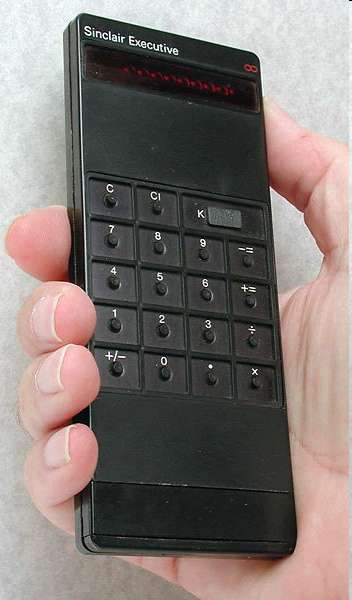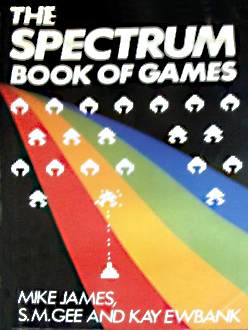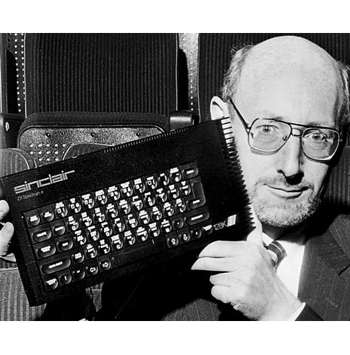| Sir Clive Sinclair Dies Aged 81 |
| Written by Sue Gee | |||
| Friday, 17 September 2021 | |||
|
Sir Clive Sinclair was the inventor who, as far as the UK was concerned, made home computing affordable, paving the way for today's thriving computer games industry. In the early eighties the UK electronics industry was vital and vigorous and much of the reason was a single individual, Clive Sinclair. He was knighted in 1983 for services to British Industry.
Clive Marles Sinclair (30 July 1940 - 16, September 2021) Clive Sinclair was born in Surrey, the oldest of three children. His father was an engineer and from an early age he showed an interest in applying science and technology. He designed a calculating machine that used punched cards and binary and was very disappointed to find that someone had thought of his "original" idea before! He was keen on mathematics which must have helped him understand the electronics that so fascinated him in his teenage years. All the signs of what he was to do in later years were there for anyone to see. He built miniature radios, amplifiers and a communications systems for his hideout in the woods. This was all in the days when electronics was just shifting from valves to transistors. Clive Sinclair was not first and foremost a computer man. To him electronics was analog first and digital only much later. His first company, Sinclair Radionics was formed to sell kits of the electronic circuits he designed and once it had developed into a manufacturing company Sinclair was keen to indulge his interest, or should that be obsession, to build a tiny TV - something he did achieve but it was a commercial flop. The commercial success, and the one that propelled him towards computers, was the world's first pocket calculator, the Sinclair Executive, a marvel of miniaturization at a time, 1972, when electronic calculators were otherwise desk bound. This device not only won design awards, it was put on show at the Museum of Modern Art in New York.
Although Sinclair Radionics went on to produce innovative products, including the first quartz watch, the Black Watch, it was beset with financial problems and, after being taken over by the National Enterprise board, was wound up. A company called Science of Cambridge, run by Chris Curry, came to the rescue and was rebranded as Sinclair Research. This was the company that came to prominence in 1980 with the release of the ZX80, the first home computer in the UK to be available for under £100. Available in both a ready-to-use version and, for a slightly lower price, as a built-it-yourself kit it was a very popular machine, due to both its capabilities and its price, but was soon superseded by even more popular models. The next year saw the launch of the ZX81, a much improved design because it used a single chip ULA (Uncommitted Logic Array) to implement a video controller, timing and interface unit. This reduced the chip count to just four and got rid of the flashing that the ZX80 suffered from. The ZX81 was probably the first usable Sinclair machine and thousands of people learned to program using on. It came in two versions - the basic one with 1K (yes 1 kilobyte) of memory and the expanded one with 16K. Even so there were games you could play using it and even some rudimentary applications. It did set a real challenge for those who wamted to program it, myself included as co-author, with Mike James, of The Art of Programming the 1K ZX81 and its extended, 16K, companion volume. The ZX Spectrum, launched in 1982, was the next model in the range and it introduced color and sound. It came in two versions, one with the basic 16K of RAM and the other with a 32K RAM extension that provided 48K of RAM. From today's perpective it seems incredible that so much could be achieved with such primitive hardware but the ZX Spectrum was the games computer that took the UK by storm and introduced BASIC to an entire generation of kids, many of whom went on to become programmers, some of them even inspired by the book authored by the I Programmer team.
Importantly for the future of programming was that at the time, the machine, and what it was capable of, was a breakthrough. In the Preface to "An Expert Guide To the Spectrum", Mike James wrote: The Sinclair Spectrum is a phenomenally successful micro-computer, and deservedly so. It is always surprising to discover how much it can achieve with so little programming effort. It can be considered a revolutionary machine because it introduces new ways of doing things. Sinclair did make an attempt to move from home computing to business computing with the QL, standing from Quantum Leap. It was based on a 68000 and requited a completely new operating system and basic interpreter. The project ran very late leaving lots of people very disillusioned with Sinclair Research and when it was finally delivered failed to make enough money for a company that was already in financial trouble due to Sinclair's other obsession, the C5 electric car, a project that had it been conceived a lot later might have met with success. This time Sinclair was bailed out by Alan Sugar's Amstrad who bought all rights to the company's products in 1986. This was hardly a rescue however as Amstrad's own products had become dominant in the UK in much the same marketplace. As far as programmers are concerned, it will be the ZX computers for which Clive Sinclair will be remembered. While the ZX-80 and ZX-81 enabled thousands of people to join in the micro-computer revolution, it was the ZX Spectrum that proved to be the quintessential "home computer", which served as an excellent introduction to computer science and to computer programming for tens of thousands of enthusiasts of all ages. Related Articles{load position signin}
Comments
or email your comment to: comments@i-programmer.info |
|||
| Last Updated ( Saturday, 25 September 2021 ) |





